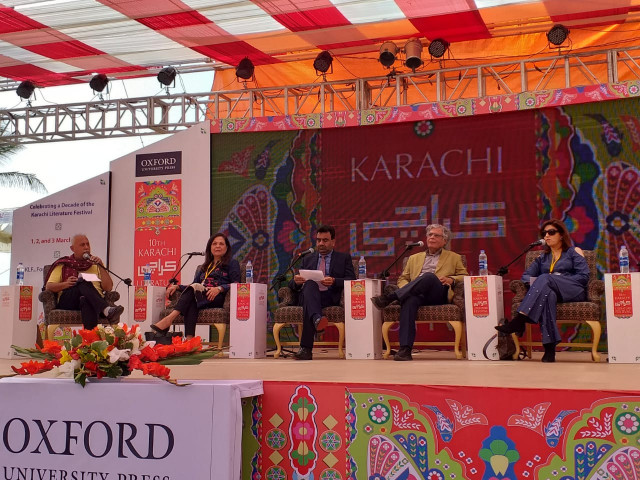Yes, the media is dumbing society. Yes, journalists are largely to blame
Panelists discuss the state of today's media and how audience choices have replaced editorial choices

PHOTO: EXPRESS
The panelists included veteran journalists Shaheen Salahuddin and Ghazi Salahuddin, academic Huma Baqai, who is also an associate dean at the Institute of Business Administration, Karachi, and poet Ghazanfar Hashmi. The session was moderated by another seasoned journalist, Wusatullah Khan.
As the session commenced, Khan introduced the topic and speakers before opening the floor to the panelists. First to speak among them was Shaheen Salahuddin, who pretty much summed up the entire debate by inviting the audience to reflect on the media coverage of the events in Pakistan and India over the last couple of weeks. "The way the Indian media portrayed the ongoing conflict, it seemed the journalists were fighting the war, not the soldiers," she remarked. It made her realise, she added, that the Pakistani media may be dumbing down society to some extent, but the Indian media surely took the cake for this one.
Role of women journalists in society praised
Hashmi concurred, saying while the Indian media hid the truth and stirred confusion, their Pakistani counterparts did a much better job. "You see, the media is a weapon which can be used both in good and bad ways," he said. "We live in a post-modern, post-truth era, where there is a bombardment of information," he explained, adding that this created confusion for the audience.
Analysts' conundrum
Khan, who was moderating the session, then invited the panelists to reflect on the quality of analysts being brought on TV shows to give their opinions on a variety of subjects. "We lack trained people who can speak succinctly on any given subject," he lamented. "The anchors and the producers too do not have enough command over the subject area," he said, adding that as a result, the same people made the rounds on different TV shows, sharing their opinions.
Adding to his point, Hashmi quipped that selected people were invited as analysts since the media caters to a popular culture or taste. "People liked by viewers are called to the shows. That's how it works in consumer-based journalism," he said. "Today, our narrative is to present as per the demands of the public."
Baqai, who makes regular appearances on talk shows, spoke about her experience with producers. "They [producers] often demand not to share intellectual thoughts, but be concise, otherwise it affects ratings," she said, adding that there was a lack of effort from the production end to add value to the content.
Investigative reporting
Another reason for 'dumbed-down' content, for lack of a better phrase, is that journalists have become too reliant on technology for reporting. "Today, journalists do not go out into the field for reporting. They have turned into Whatsapp junkies and avid Google users," said Khan. He added that investigative journalism had almost become extinct. "Investigative reporting requires funds, which media houses are unwilling to cough up," he said.
Shaheen, however, blamed journalists for the decline in standards. "Today, we journalists get dictated because our fraternity has turned lazy," she quipped.
Hashmi, however, had a slightly different take. "There is a demand for popular journalism in Pakistan and not investigative journalism," he said. "One of the reasons that our media is dumbing society is celebrity-following. Information is propagated through the celebrities since it requires less efforts and no investigation," he added.
Viewership demands
A long time ago, said Baqai, "the media decided to refrain from airing intellectual items because they believed it would not garner viewership due to the lack of understanding of the viewers". This is where we find ourselves today. She added, however, that the media does play an important role in agenda-setting. "It has gone to the extent where we see the media of one country attacking the media of another country," she said.
When it came to Ghazi Salahuddian, who has enjoyed a long and illustrious career in the print industry, he stressed that the print media offered the chance to touch upon intellectual themes. Giving the example of The International New York Times, he said that the publication's content after Donald Trump became president was exemplary. "It presents the truth and critical analysis," he observed. For Ghazi, while there are good standards of Op-Ed and English Journalism practices in Pakistan, "we unfortunately do not have enough editorial readers."
Comparing the US media to Pakistan's, he said that the US has few national newspapers to deliver the information, while in Pakistan, the picture was the opposite. "There are fewer viewers and more channels."
The veteran journalists also stressed the need to revisiting the rules and ethical standards. "There is a need to revisit our past rules and ethics considering the transformation of the media and to see how you can play your fundamental role as a journalist," he said. "We will have to adopt innovation and new methods," he urged, adding that the media, today, was under more restrictions than during Ziaul Haq's regime. "Back then, we were aware of the rules of the game but now we don't. We knew we could have been incarcerated, but did not fear going missing," he said.
But giving up is not an option, said Ghazi. "We must not compromise, no matter how tough the situation gets," he said, adding that the civil society, which forms its intelligentsia, must also be willing to stand up for journalists when they are targeted for speaking the truth to power.


















COMMENTS
Comments are moderated and generally will be posted if they are on-topic and not abusive.
For more information, please see our Comments FAQ